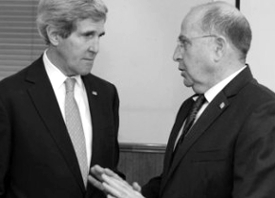
One can distinctly see the complete failure, rather than the light at the end of the tunnel. As predicted by many observers, the negotiations will reach an impasse and end in a failure. Undoubtedly, the Israeli party is playing for time and expects such a “result”. They continue to “beat the air” tediously and hopelessly. The Israelis insist that the Palestinians recognize the “Jewish Character” of the state and at the same time, continue to build Jewish settlements on the occupied West Bank of Jordan, changing the demographic character of East Jerusalem.
In addition, a number of critical issues such as the problem of Palestinian refugees, the recognition of the borders for the future states of Jewish and Palestinian peoples continue to be bones of contention. In an environment filled with uncertainty and pessimism, the public reply of the Israeli Defense Minister Moshe ‘Bogie’ Ya’alon played the role of a fuse. According to the Minister, the plan of the Secretary of State John Kerry “is not worth even the paper on which it was written, and provides neither peace nor security”. Moreover, Ya’alon mockingly said: “We will feel safe only when John Kerry wins the Nobel Peace Prize and leaves us alone”.
It is not without reason that Washington perceived this remark of the Israeli general as an insult. However, it is unlikely that this was Ya’alon’s personal opinion. Most likely, these words reflect the attitudes of the senior political leaders in Israel. The statement, made by the Israeli minister only aggravated the situation in these sluggish negotiations. It only reinforced the existing hostile relations between Obama and Netanyahu. Americans did not keep this fact secret, on the contrary, they demanded an apology from the Israeli side, which remains an ally and strategic partner of the U.S.A., and the apology came immediately. Nowadays, personal relationships and mutual friendliness of the political leaders play an important role in relationships at the state level. So, this disagreeable incident will not be soon forgotten.
The again, what proposals were made by the Israelis in these negotiations? The U.S. administration paid attention to the long cherished idea of the Israeli Foreign Minister, who returned to active political activity, to exchange populated areas with the Palestinian Authority. B. Netanyahu had a surprising proposal to increase the number of enclaves that Israel desired to obtain from the PA from three to four, that is, to purchase Beit El together with the adjoining settlements from them. These occupied territories are inhabited by religious settlers. Grounds for such a proposal can, of course, sound quite reasonable, since it is said in the Old Testament that in this very Beit El, the Israeli forefather Jacob fell asleep, and in his dream, he saw a staircase leading into the sky, on which angels were climbing.
However, for some reasons, Mahmoud Abbas did not support such a proposal. Yes, it was clear from the very beginning that there are no chances for such a deal, and in fact, it was intended to wreck the talks, and looks like a provocation.
Moscow, Washington and Brussels continue to closely monitor these negotiations. New ideas and approaches are required to set the negotiations in motion. The Israelis do not have any, (unless you consider the purchase of Beit El at a reasonable price). However, we should also note that Ramallah has no new proposals either. It is quite possible that under these circumstances, some Israeli politicians regard a military solution to the problem as the most appropriate course in this situation.
The final breakdown in the negotiations is unlikely to end with the preservation of the former status quo. Wreckage or failure of the negotiations could lead to a third intifada, which may well escalate the conflict. These developments may even reduce the influence of the United States in this region. If this happens, the Israeli political establishment, with an even greater sense of responsibility will heed the position and role of Russia in the Middle East, which has returned to this region and whose influence is now growing. The only hope is in John Kerry, who may suddenly come up with a new unexpected proposal. However, the time of miracles has long sunk into oblivion.
Alexander Efimov, PhD of Historical Sciences, Middle East expert, exclusively for the online magazine “New Eastern Outlook”.
